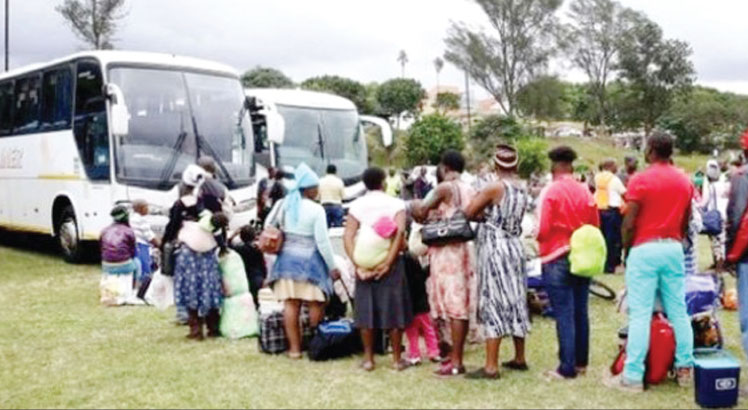You have probably heard of some men abandoning their wives as they migrate to South Africa for greener pastures.
The tales of runaway husbands are common in Mzimba and Mangochi, the main exporters of casual labour to the self-stylled Rainbow Nation.
You may also have heard of single Malawian men in the southernmost African State who engage their friends and relatives back home to scout for suitors they have never met.
Chifundo Nkhoma, from Mankhangala Village in Mzimba, testifies to such ‘fairytales.’
“My husband left me with a two-month-old baby, promising me to join him there if he found a stable job, but he left me in the cold” she explains.
It is now six years and the man has never returned to the woman holed up in the remote setting under Traditional Authority Khosolo.
“He even stopped calling me and sending child support. When asked, he told me to return to my parents’ home. I just heard he married another woman in South Africa,” she recounts.
The woman struggles to singlehandedly raise the child who is in Standard One at a public primary school in Khosolo.
“My parents are now old and can’t take care of me and my child. They struggle to feed themselves,” she laments.
Nkhoma is just an example of several women in this plight fuelled by economic exodus.
In 2020, a census in South Africa showed the country plays home to about 87 000 Malawians.
And M’Mbelwa District Council reports that at least 25 Malawians aged 15 to 25 in Mzimba process travel documents every day to trek to South Africa.
Their southward trips personify an escape from the country’s massive youth unemployment. The International Labour Organisation of the UN reports that one in four Malawians aged 18 to 35 seek employment, but find none.
However, the march to South Africa has left women and girls suffering in silence at the hands of some migrants.
Inkosi ya Makosi M’Mbelwa says gender-based violence (GBV) fuelled by migration remains a “huge multi-faced problem” in his kingdom as some of the youth only return when they die.
“Our youthful citizens migrate to South Africa, but most of them come back as dead bodies,” he says, calling for fair treatment of women and children left behind.
The Ngoni chief says the phenomenon requires diverse solutions, including job creation and access to business loans to nip the rising exodus in its bud.
During this year’s Umtheto Cultural Festival, he said: “We understand we have the National Economic Empowerment Fund.
“But the problem is that it takes a long time for youths to access the loans.”
“We need help from the government to soften conditions and ease access to the loans.
The cultural festival at the foot of Hora Mountain in Mzimba dialled up the campaign against irregular migration and human trafficking.
Khosolo Women’s Forum chairperson Joyce Mwale says there is a need to fight back against migration-related practices fuelling GBV in the vast district.
“The abandoned women suffer psychologically as they have to deal with heartbreaks. They are also subjected to financial abuse as most of these men do not send any support,” she states.
The UN Women reports that at least one in three women experience GBV in their lifetime and less than two in every five who experience violence seek help.
In Mzimba, Mwale says her group is reaching out to over 2 000 abused women in the area of T/A Khosolo whether they report abuse or not.
The women’s forum encourages the deserted women to join village savings and loan groups and livestock pass-on programmes to financially support themselves and their children in the absence of runaway husbands.
“For those experiencing psychological torture, we are reaching out to them with counselling services,” it says.
Gender activist Pamela Kuwali, from ActionAid Malawi, says women’s economic empowerment is essential to achieving gender equality and addressing barriers that restrict women’s ability to break the cycle of violence.
“Creating livelihood opportunities for women not only enables them to have an equal opportunity to participate at all levels of society, but also serves to protect women and girls from violence by eliminating economic vulnerability,” she says.
World Bank notes that Malawi has a progressive legal environment, including the Constitution, 12 enabling gender-related laws, 10 policies and nine international treaties against GBV.
“However, low and fragmented allocation of resources to support the implementation of existing laws, policies, and programmes, continues to constrain efforts to close the remaining gender gaps and prevent GBV,” reads the bank’s newly released Malawi Gender Assessment and Gender-Based Violence Assessment.
But Minister of Gender, Community Development and Social Welfare Patricia Kaliati says the government, non-governmental organisations and development partners have various programmes pumping resources to eliminate violence against women and girls.
“The initiatives support targeted large-scale investments aimed at achieving significant impact in the lives of women and girls,” she says.
Kaliati cited the Spotlight Initiative funded by the European Union through the UN.
The post Youth migration fuels GBV appeared first on The Nation Online.
 Moni Malawi
Moni Malawi 
